

Most ebook files are in PDF format, so you can easily read them using various software such as Foxit Reader or directly on the Google Chrome browser.
Some ebook files are released by publishers in other formats such as .awz, .mobi, .epub, .fb2, etc. You may need to install specific software to read these formats on mobile/PC, such as Calibre.
Please read the tutorial at this link: https://ebookbell.com/faq
We offer FREE conversion to the popular formats you request; however, this may take some time. Therefore, right after payment, please email us, and we will try to provide the service as quickly as possible.
For some exceptional file formats or broken links (if any), please refrain from opening any disputes. Instead, email us first, and we will try to assist within a maximum of 6 hours.
EbookBell Team

0.0
0 reviewsNew Developments in the Bioarchaeology of Care evaluates, refines and expands existing concepts and practices in the developing field of bioarchaeological research into health-related care provision in the past.
Evidence in human remains that indicates an individual survived with, or following, a serious pathology suggests this person most likely received some form of care from others. This observation was first made half a century ago, but it is only in the last five years that health-related caregiving has been accepted as a topic for bioarchaeology research. In this time, interest has grown exponentially. A focus on care provides a dynamic framework for examining the experiences of disease and disability in the past - at the level of the individual receiving care, and that of the community providing it. When caregiving can be identified in the archaeological record, bioarchaeologists may be able to offer unique insights into aspects of past lifeways.
This volume represents the work of an international, diverse, cross-disciplinary group of contributors, each bringing their own particular focus, style and expertise to analyzing past health-related care. Nineteen chapters offer content that ranges from an introduction to the basic 'bioarchaeology of care' approach, through original case studies of care provision, to new theoretical perspectives in this emerging area of scholarship. This book creates a synergy that challenges our thinking about past health-related care behaviors and about the implications of these behaviors for understanding the social environment in which they took place.